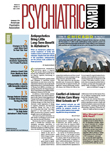Acute hospitalization and death appear to occur frequently among older adults with dementia who have been prescribed antipsychotic medication within the previous 30 days.
That was the finding of a retrospective cohort study of community-dwelling elderly and nursing-home residents with dementia who were prescribed antipsychotic medication. The study appeared in the May 26 Archives of Internal Medicine.
Older adults in the community with dementia who received atypical antipsychotic medications were 3.2 times more likely to experience a serious adverse event within 30 days of starting therapy than were similar older adults who did not receive such therapy; those receiving a conventional antipsychotic were almost 3.8 times as likely.
The pattern was similar, though less pronounced, among nursing-home residents who were and were not prescribed antipsychotics: those receiving atypical antipsychotics were 1.9 times more likely to experience an adverse event within 30 days than those who did not, and those who received conventional antipsychotic therapy were 2.4 times more likely.
The study authors stated that the findings may represent only the tip of an iceberg because the study focused only on events serious enough to result in hospital admission, and because the 30-day follow-up cannot account for adverse events such as tardive dyskinesia that take longer to develop or to be recognized by the physician.
But soon after the
Archives of Internal Medicine report appeared, a follow-up analysis of the Clinical Antipsychotic Trials of Intervention Effectiveness–Alzheimer's Disease (CATIE-AD) was published, showing that psychiatric and behavioral symptoms associated with Alzheimer's disease, such as agitation, aggression, and paranoid thoughts and ideas, may improve with the use of second-generation antipsychotics. That report is posted on
AJP in Advance at<
http://ajp.psychiatryonline.org/pap.dtl> and will appear in print in the July
American Journal of Psychiatry (see Antipsychotics Bring Little Long-Term Benefit in Alzheimer's).
In an interview with Psychiatric News, lead author of the Archives of Internal Medicine report Paula Rochon, M.D., said her study was looking only at adverse events and not at efficacy, and said she believes the two studies do not contradict each other.
“I think our message is not necessarily that these drugs should never be used,” she said. “Clearly, there is a role for them in people who have dangerous behaviors. But there are also side effects. If these medications are going to be used, clinicians need to balance the risks and the benefits.
“One of the things we are concerned about is that these are fairly commonly used and perhaps well beyond their indications,” Rochon told Psychiatric News.
In the report, she and colleagues noted that a 2004 study in the Journal of the American Geriatrics Society found that 17 percent of nursing-home residents were prescribed an antipsychotic within 100 days of their being admitted.
Rochon said that for patients with dementia whose behavior poses a danger to themselves or others, antipsychotics are likely to be useful. But for patients with mild agitation that is not dangerous, clinicians should consider nonpharmacological approaches to managing the agitation.
She is a geriatrician and scientist at the Institute for Clinical Evaluative Studies and a professor of medicine at the University of Toronto.
Rochon and colleagues conducted a population-based, retrospective, cohort study using Ontario, Canada, administrative health care data between April 1, 1997, and March 31, 2004. They looked at two cohorts: community-dwelling elderly and nursing-home residents with a diagnosis of dementia based on ICD-9 criteria. Individuals were included in the nursing-home cohort if their index drug claim was submitted by a long-term-care facility. Otherwise, they were assumed to be community dwellers.
For each cohort, they identified three groups of equal size based on antipsychotic drug exposure: none, atypical, or conventional. The most frequently prescribed atypicals were risperidone, olanzapine, and quetiapine. The most frequently prescribed conventional antipsychotic drugs were haloperidol, loxapine, and thioridazine.
The “none” group was a control group that included older adults with dementia who had not been given prescriptions for antipsychotic drugs but had been given at least one other medication. Acute-care hospital admissions were divided into two categories: known serious events including extrapyramidal symptoms (EPS), falls or hip fractures, and cerebrovascular events; or other events.
There were several groups of patients who were excluded: those with a history of schizophrenia, tics, Huntington's disease, and dialysis during the previous five years; those with a history of parkinsonism or other EPS during the previous five years; and individuals with a history of brain tumor. Similarly, the researchers also excluded individuals with a diagnosis of epilepsy or trauma or a history of pathological fractures or hip fractures.
To ensure that death was likely related to antipsychotic therapy, they excluded deaths among individuals receiving palliative care because, although antipsychotic drugs may be used in this setting, death is an expected outcome.
Among 6,894 community-dwelling subjects who received an atypical antipsychotic, 13.9 percent experienced a serious event, and 2.7 percent of the subjects died. The percentages for community-dwelling subjects who received a conventional antipsychotic were higher: 16 percent and 4.6 percent for serious events and deaths, respectively.
Among 6,853 nursing-home subjects who received a prescription for an atypical antipsychotic, 9.4 percent experienced a serious event, and 5.2 percent died within 30 days of receiving a prescription for an atypical antipsychotic drug. Among the same number receiving a conventional antipsychotic, the figures were again higher: 11.6 percent for serious events and 6.5 percent for deaths.
By comparison, 4.4 percent of the 6,894 community subjects who did not receive an antipsychotic experienced a serious event, and 1.2 percent died. And for the 6,853 nursing home subjects who did not receive an antipsychotic, 5.6 percent experienced a serious event, and 3.3 percent died.
An abstract of “Antipsychotic Therapy and Short-Term Serious Events in Older Adults With Dementia” is posted at<http://archinte.ama-assn.org/cgi/content/abstract/168/10/1090>.“
Neuroleptic Drug Therapy in Older Adults Newly Admitted to Nursing Homes: Incidence, Dose, and Specialist Contact” can be accessed at<www.blackwell-synergy.com/toc/jgs/52/5>.▪
